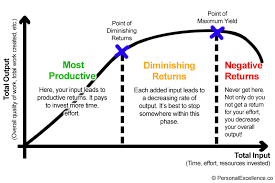This message is for people who work too hard.
At some point when I was a kid, I vaguely recall that I was a perfectionist. If I worked on a project for school, I would try to go above and beyond, getting every little detail to the best of my ability. It didn’t seem right to stop when there was still more I knew I could do to improve. Perhaps you can relate to that feeling.
I think at some point I became a procrastinator, largely to prevent this perfectionism. If I only allowed myself two hours to do a project, then I would do the best I could in that two hours and working more on little details was not an option anymore.
Another thing that helped change my perspective on perfection was learning about the law of diminishing returns. This was an economic term that explained the very common phenomenon that the more effort you put into something, the less actual benefit. We humans usually assume that if something is good, more is better, but that is not always the case.
Consider: the first hour you spend studying for a test might get you a 70%, the next hour bumps that up to an 85% and another hour gets you an A at 93%. If you just need an A for your transcript, does putting another 3 hours in to make sure you get a 100% really benefit you? What about if you stay up all night studying and then you fall asleep during the test and fail it?
Here’s another example. The big box store spends money to prevent shoplifting. They install some cameras, hire a guard and maybe put security devices on items. This is called “Loss Prevention.” They could spend even more money to hire more guards, employ extensive technologies and thorough methods, but if they did manage to completely prevent shoplifting, they would almost certainly have spent more money to prevent all the shoplifting than they saved by accomplishing their perfect goal.

I also started to realize that the “perfection” I was chasing was very narrowly focused. If I spend all weekend on a school project, I might see myself as a perfect student, but it would be imperfect of me to neglect my friends and family. If in theory you could be perfect in one area, it would almost always come at severe cost to other areas. But that first amount of effort in an area paid big dividends, and if I could settle for being good enough at something, then I would have time to spare to be good at many things. I started to wonder if perfection in the grand scheme of things was being a good student, a good son, a good friend, etc., and still have time to play and relax so that I actually enjoyed my life.
Consider the verse: “Some people, eager for money, have wandered from the faith and pierced themselves with many griefs.” 1 Tim 6:10 NIV.
I’ve always been struck by that term, “pierced with many griefs.” It’s so true. Money is important, but like I said before, we think that if something is good, more is better. There are many times in my life where I have opportunities to make more money. But I have recognized that the law of diminishing returns applies. If I do all the work on an investment, I might get a 7% return on investment. If I turn the management side over to someone else, then I almost eliminate my stress, and still get a 6% return on investment. How much is my peace of mind worth? Isn’t that part of the reason we chase money, because we think it will make our lives better?
Perhaps you aren’t into investing, but have opportunities to take on a second or third job. There are times where that may be necessary, but if those extra hours increase your income 10% but take up 100% of your free time, when do you plan to enjoy that extra money? Was it worth it? What if you work 12 hours a day to provide a nice home for your family, but they would rather live in a smaller house and actually have you home in the evenings?
Saving, budgeting and working hard are very important, but consider that the law of diminishing returns indicates that the first amount you spend on a task is most productive. Rather than spend 100% of your effort on the future, make sure to put some effort into enjoying today. Treating yourself occasionally and taking it a little easier can make those working decades much more enjoyable. You wouldn’t want to pinch every penny for forty years and have plenty of income to retire on, but not enjoy it because your health is too bad.
These are just intended to be a few more pieces of the puzzle to help with the usual needs for perspective and balance. I hope you find them as beneficial as I have. It’s always nice when five minutes of learning can improve the rest of your life. That’s a pretty good return on investment.